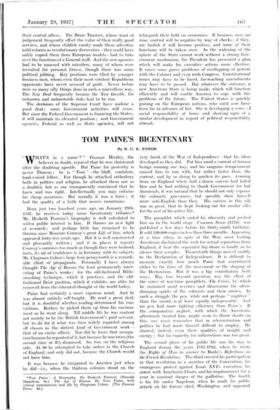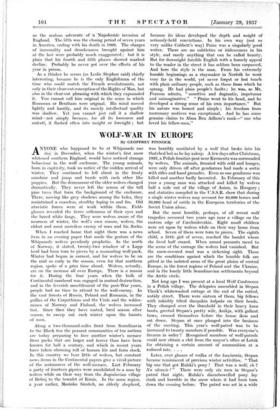TOM PAINE'S BICENTENARY
By R. C. K. ENSOR
WHAT'S in a name ? " Thomas Huxley, the believer in doubt, rejoiced that he was christened after the doubting apostle. But Paine for posterity is never Thomas ; he is " Tom "—the bluff, confident, loud-voiced fellow. For though he attacked orthodoxy both in politics and religion, he attacked them not as a doubter, but as one transparently convinced that he knew and was right. Intellectually you may criticise his cheap assurance. But morally it was a force ; it had the quality of a faith that moves mountains.
Born just two hundred years ago, on January 29th, 1737, he receives today some bicentenary tributes.* Mr. Hesketh Pearson's biography is well calculated to widen public interest in him. It throws no new light of research ; and perhaps little has remained to be thrown since Moncure Conway's great Life of him, which appeared forty-five years ago. But it is well constructed and pleasantly written ; and if in places it repeats Conway's surmises too much as though they were bedrock facts, its air of confidence is in harmony with its subject. Mr. Chapman Cohen's large four-pennyworth is a remark- able effort of propaganda. Personally I have always thought The Age of Reason the least permanently inter- esting of. Paine's works ; for the old-fashioned Bible- smashing technique, which it practises, and the old- fashioned Deist position, which it exhibits, are alike far removed from the educated thought of the world today.
Paine had certainly a most vigorous mind. And he was almost entirely self-taught. He read a great deal, but it is doubtful whether reading determined his con- victions. Rather, he picked them up from his environ- ment as he went along. Till middle life he was content not merely to be the British Government's paid servant, but to do for it what was then widely regarded among all classes as the dirtiest kind of Government work— that of an excise officer. Nor did he leave that occupa- tion because he repented of it, but because he was twice (the second time at 87) dismissed: So, too, on the religious side. - At 30 he attempted to take orders in the Church of England, and only did not, because the Church would not haVe It was because he emigrated to America just when he did—i.e., when the thirteen colonies stood on the
*Tom Paine' : A Biography. By Hesketh Pearson. (Bernath Hamilton. 9s.) The Age of Reason. By Tom Paine, with critical introduction and life by Chapman Cohen. (The Pioneer Press: 4421.)
very brink of the War of Independence—that his ideas developed as they did. Put him amid a current of human beings running one way, and his sanguine temperament caused him to run with, but rather faster than. the current, and by so doing to quicken its pace. Coming front an England where half a dozen careers had failed him and he had nothing to thank Government for but dismissals, it was natural that lie should not only espouse the colonists' grievances, but speedily show himself more anti-English than they. His success in this role was so great, that he kept looking out for similar roles for the rest of his active life.
The pamphlet which ended his obscurity and pushed him on to the world stage—Common Sense (1776) was published a few days before his thirty-ninth birthday. It sold 120,000 copies in less than three months. Appearing at a time when, in spite of the War, most leading Americans disclaimed the wish for actual separation from England. it beat. the separatist big drum so loudly as to silence their scruples. Thenceforth things moved swiftly to the Declaration of Independence. It is difficult to measure exactly how much Paine had contributed either to the force of the movement or the shaping of the Declaration. But it was a big contribution both ways. Big, too, beyond question, was the effect of the series of war-time pamphlets, The Crisis, by which he sustained amid reverses and dissensions the often- drooping spirits of the colonists and their armies. In such a struggle the pen. while not perhaps " mightier " than the sword, is at least equally indispensable. And no pen had more fighting efficiency than Paine's. If the comparative neglect, with whirl' the Americans afterwards treated him, might seem to throw doubt. on this, one must remember that in administration and politics he had made himself difficult to employ. Ile showed, indeed, even there qualities of insight and energy ; but his capacity for indiscretions was too great.
The second phase of his public life was his stay in England during the years 1787-1792, when he wrote the Rights of Man in answer to Burke's Reflections on the French Revolution. The third covered his participation in that revolution as a member of the Convention, his courageous protest against Louis XVI's execution, his arrest with Anacharsis Cloots, and his imprisonment for a year in constant danger of the guillotine. The fourth is his lift under Napoleon, when he made his public attack on his former chief, Washington, and appeared as the zealous -advocate of It -NdpcileblIfe invasion of England. The fifth was the closing period of seven years in America, ending with his death in 1809. The charges of immorality and drunkenness brought against him at the last were probably much exaggerated ; but it is plain that his fourth and fifth phases showed marked decline. Probably he never got over the effects of his year in prison.
As a thinker he seems (as Leslie Stephen said) chiefly interesting, because he is the only Englishman of the time who could match the French revolutionists, not only in their clear-cut conception of the Rights of Man, but also in the clear-cut phrasing with which they expounded it. You cannot call him original in the sense in which Rousseau or Bentham were original. His mind moved lightly and hastily, and its merely intellectual quality was shallow. Yet you cannot just call it a shallow mind—not simply because, for all its looseness and naivetes, it flashed often into insight or foresight ; but because its ideas developed the depth and weight of seriously-held convictions. In his own way (not so very unlike Cobbett's way) Paine was a singularly 'good writer; There are no subtleties or iridescences in his style, and rarely anything that can be called beauty. But for downright. forcible English with a homely appeal to the reader in the street it has seldom been surpassed. And here the style is the man. From his extremely humble beginnings as a staymaker in Norfolk he went very far in the world, yet never forgot or lost touch with plain ordinary people, such as those from which he sprang. He had plain people's faults ; he was, as Mr, Pearson admits, " assertive and dogmatic, impetuous and unimaginative." " Praise went to his head, and he developed a strong sense of his own importance." But his nature was honest and simple ; his freedom from mercenary motives was exceptional. And he has some genuine claims to Abou Ben Adhem's rank—" one who loved his fellow-men."























































 Previous page
Previous page